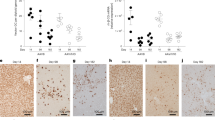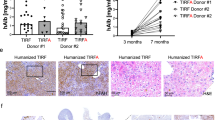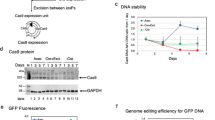Abstract
Adenoviral (Ad) vectors are good candidates for gene therapy in view of their high in vivo gene delivery efficiency. However, greater control over the tissue distribution of transgene expression is required to avoid potentially deleterious effects in non-target organs. In this regard, the liver is particularly at risk due to the high natural tropism of Ad for this organ, where dose limiting toxicity has been seen due to toxic transgene expression. We hypothesized that the cre/loxP system could be utilized to reduce unintended transgene expression at this site. This concept was tested using an Ad vector (AdLCLLL) carrying a reporter gene cassette in which the promoter and luciferase gene were flanked by LoxP sequences. Co-administration of this vector with a second vector carrying the cre recombinase gene in vitro and in vivo resulted in specific down-regulation of transgene expression. This novel approach thus has the potential to improve the safety of gene therapy strategies that rely upon the delivery of genes which may be hepatotoxic.
This is a preview of subscription content, access via your institution
Access options
Subscribe to this journal
Receive 12 print issues and online access
$259.00 per year
only $21.58 per issue
Buy this article
- Purchase on Springer Link
- Instant access to full article PDF
Prices may be subject to local taxes which are calculated during checkout





Similar content being viewed by others
References
Brody SL, Crystal RG . Adenovirus-mediated in vivo gene transfer Ann NY Acad Sci 1994 716: 90–101
Reynolds PN et al. A targetable injectable adenoviral vector for selective gene delivery to pulmonary endothelium in vivo Mol Ther 2000 2: 562–578
Douglas JT et al. Targeted gene delivery by tropism-modified adenoviral vectors Nat Biotech 1996 14: 1574–1578
Dmitriev I et al. An adenovirus vector with genetically modified fibers demonstrates expanded tropism via utilization of a coxsackievirus and adenovirus receptor-independent cell entry mechanism J Virol 1998 72: 9706–9713
Wickham TJ et al. Increased in vitro and in vivo gene transfer by adenovirus vectors containing chimeric fiber proteins J Virol 1997 71: 8221–8229
Adachi Y et al. Midkine promoter-based adenoviral vector gene delivery for pediatric solid tumors Cancer Res 2000 60: 4305–4310
Koeneman KS et al. Osteocalcin-directed gene therapy for prostate-cancer bone metastasis World J Urol 2000 18: 102–110
Gao GP, Yang Y, Wilson JM . Biology of adenovirus vectors with E1 and E4 deletions for liver-directed gene therapy J Virol 1996 70: 8934–8943
Brand K et al. Liver-associated toxicity of the HSV-tk/GCV approach and adenoviral vectors Cancer Gene Ther 1997 4: 9–16
van der Eb MM et al. Severe hepatic dysfunction after adenovirus-mediated transfer of the herpes simplex virus thymidine kinase gene and ganciclovir administration Gene Therapy 1998 5: 451–458
Lakso M et al. Efficient in vivo manipulation of mouse genomic sequences at the zygote stage Proc Natl Acad Sci USA 1996 93: 5860–5865
Ramirez-Solis R, Liu P, Bradley A . Chromosome engineering in mice Nature 1995 378: 720–724
Wang Y, Krushel LA, Edelman GM . Targeted DNA recombination in vivo using an adenovirus carrying the cre recombinase gene Proc Natl Acad Sci USA 1996 93: 3932–3936
Sakai K, Mitani K, Miyazaki J . Efficient regulation of gene expression by adenovirus vector-mediated delivery of the CRE recombinase Biochem Biophys Res Commun 1995 217: 393–401
Lewandoski M, Martin GR . Cre-mediated chromosome loss in mice Nat Genet 1997 17: 223–225
Okuyama T et al. Efficient Fas-ligand gene expression in rodent liver after intravenous injection of a recombinant adenovirus by the use of a Cre-mediated switching system Gene Therapy 1998 5: 1047–1053
Bilbao G et al. Construction of a recombinant adenovirus vector encoding Fas ligand with a CRE/Loxp inducible system Transplant Proc 1999 31: 792–793
Arafat WO et al. An adenovirus encoding proapoptotic Bax induces apoptosis and enhances the radiation effect in human ovarian cancer Mol Ther 2000 1: 545–554
He TC et al. A simplified system for generating recombinant adenoviruses Proc Natl Acad Sci USA 1998 95: 2509–2514
Rancourt C et al. FGF2-enhancement of adenovirus-mediated delivery of the herpes simplex virus thymidine kinase gene results in augmented therapeutic benefit in a murine model of ovarian cancer Clin Cancer Res 1998 4: 2455–2461
Alemany R, Balague C, Curiel DT . Replicative adenoviruses for cancer therapy Nat Biotechnol 2000 18: 723–727
Acknowledgements
This work was supported by the following grants: NIH R01 CA74242, NIH R01 HL50255, NIH R01 CA 86881–01 and NCI N01C0–97110.
Author information
Authors and Affiliations
Rights and permissions
About this article
Cite this article
Reynolds, P., Holmes, M., Adachi, Y. et al. A novel system for mitigation of ectopic transgene expression induced by adenoviral vectors. Gene Ther 8, 1271–1275 (2001). https://doi.org/10.1038/sj.gt.3301511
Received:
Accepted:
Published:
Issue Date:
DOI: https://doi.org/10.1038/sj.gt.3301511



